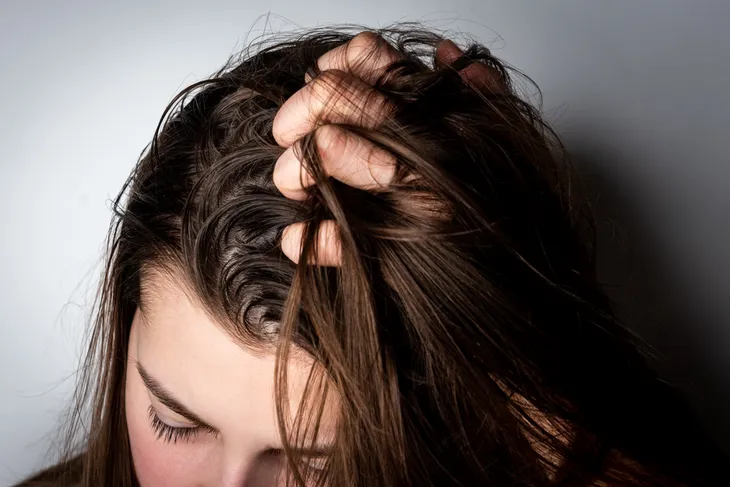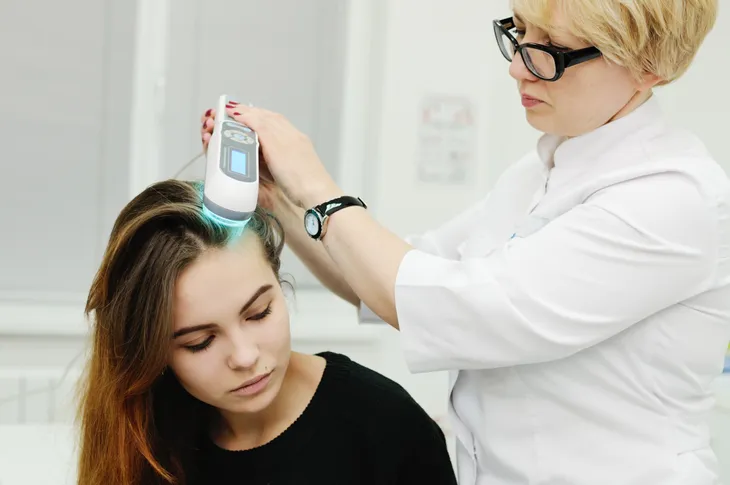- Scalp psoriasis is a common condition that causes itchy, thickened, and flaky skin.
- Treatment options for scalp psoriasis depend on the severity and may include topical treatment, light therapy, and medication.
- Diagnosing scalp psoriasis can be difficult because it shares symptoms with other skin conditions.
- Nobody knows exactly what causes scalp psoriasis, but it’s likely a combination of genetics and lifestyle factors.
- Many people with scalp psoriasis experience ‘flares’ when their symptoms worsen, and they may notice specific flare triggers.
Scalp psoriasis is a common condition affecting between 2- and 3-percent of the world’s population and over 8 million Americans. Symptoms of the condition vary between people and can range from mild, dandruff-like flakiness to severe inflammation.
If you suspect your itchy scalp might actually be scalp psoriasis, learning about the condition can help you access the treatment you need. This guide explains everything you need to know about scalp psoriasis symptoms, treatment, and self-care.
Signs and Symptoms of Scalp Psoriasis
The most common symptoms of scalp psoriasis are dry and flaky skin on the scalp, which may feel sore or itchy. Scalp psoriasis causes thick, red patches of skin in some people, while others may notice silvery, scaly areas. The condition often causes dry pieces of skin to flake off, which are easy to mistake for dandruff.
If your scalp is very dry, cracks may form in the skin and lead to bleeding. Some people also experience hair loss around the affected areas, although this symptom often resolves with treatment. Scalp psoriasis symptoms may remain consistent over time, or you may experience a pattern of worsening symptoms (flares) alternating with periods when you feel better (remission.)
What Causes Scalp Psoriasis?
Scalp psoriasis isn’t contagious, so you can’t catch it by coming into contact with someone who has the condition. Scalp psoriasis has the same cause as other types of psoriasis, although it’s unclear exactly why it affects certain people. Scientists studying the condition believe it may have genetic and environmental causes.
People with psoriasis have problems with their immune systems that cause rapid and inappropriate skin cell growth. The skin cells grow faster than the body can shed them, leading to the formation of scaly or thickened patches.
Scalp Psoriasis Diagnosis
Diagnosing scalp psoriasis sometimes presents a challenge to physicians because it looks similar to several other skin conditions that commonly affect the scalp. However, an experienced doctor may be able to diagnose scalp psoriasis simply by examining your skin. They may ask questions about your overall health and examine other parts of your body, such as your nails, to look for signs of disease activity.
Your healthcare provider may request a skin biopsy if the diagnosis is unclear. A skin biopsy is a straightforward outpatient procedure and involves removing a small piece of skin from the scalp and looking at it under a microscope.
Scalp Psoriasis Treatment Options
Fortunately, various treatment options for scalp psoriasis can slow down skin cell growth and reduce flaking and irritation. How your doctor treats scalp psoriasis depends on the severity of your condition, and they may prescribe topical treatments, light therapy, or medication to get your symptoms under control.
The most effective treatment pathway varies from person to person, and you may have to try several options before you find an option that works for you. Some people require a combination of two or more treatment types, especially if they have severe scalp psoriasis.
Topical Treatments for Scalp Psoriasis
Topical ointments or shampoos can often treat mild-to-moderate scalp psoriasis without the need for oral or injectable medications. Generally, doctors prescribe corticosteroid lotions, gels, or shampoos as a first-line treatment. Often, people use corticosteroids during flares and reduce their usage during remission because regular applications can cause skin thinning and make the medication less effective.
Some people with scalp psoriasis find that washing their hair with salicylic acid shampoo reduces irritation and skin flaking. You can purchase milder versions of this shampoo over the counter at a pharmacy or get a prescription for a stronger version from your doctor. Alternatively, you could try using coal tar shampoo to soothe a red, itchy scalp.
Light Therapy for Scalp Psoriasis
If your scalp psoriasis is more severe, your doctor may recommend light therapy as a first-line treatment. Light therapy is more commonly prescribed for people with widespread psoriasis, so it’s more likely to be suitable if your condition also affects other body parts. The treatment involves exposing the affected skin to ultraviolet light B under controlled conditions.
Some people self-administer light therapy at home using a handheld device following their doctor’s instructions. Alternatively, you can receive treatment from a licensed dermatologist at an outpatient clinic. You’ll need to have regular, consistent treatment to achieve symptom relief, so you may find the at-home treatment more convenient.
Medications for Scalp Psoriasis
You may require oral or injectable medications if you have severe scalp psoriasis, particularly if it also affects other areas of your body. Your doctor may prescribe systemic medications that correct your immune system’s responses to reduce inflammation. Some people need disease-modifying anti-rheumatic medications if they’re at risk of developing complications, such as psoriatic arthritis.
Systemic medications used to treat scalp psoriasis can sometimes cause nausea. Therefore, some people prefer to receive their medication as an injection to reduce the effect on their digestive system.
Who’s at Risk of Scalp Psoriasis?
Scientists don’t fully understand why some people experience scalp psoriasis and not others. You can develop the condition at any age, but around 33-percent of people first experience symptoms during childhood.
You’re more likely to have scalp psoriasis if one of your biological parents has the condition, especially if both parents have it. Furthermore, people who smoke tobacco have a higher risk of scalp psoriasis and often experience more severe symptoms. Other potential risk factors include:
- Taking certain medications
- History of strep throat infection
- Alcohol abuse
- Obesity
 Ahmet Misirligul / Shutterstock
Ahmet Misirligul / ShutterstockDifferential Diagnoses
It can be challenging to tell scalp psoriasis apart from seborrheic dermatitis, another common condition that causes itchy, flaky skin on the scalp. Both conditions can cause itchiness, redness, and crustiness, and some of the treatment pathways are the same. However, scalp psoriasis is more likely to cause skin issues beyond the hairline or on other parts of the body than seborrheic dermatitis and is typically more resistant to treatment.
Lichen planus is also commonly mistaken for scalp psoriasis and causes a raised, colorless rash on the skin. However, unlike psoriasis, lichen planus often affects the inside of the mouth and doesn’t usually cause scaly skin.
Scalp Psoriasis Prognosis
Scalp psoriasis isn’t curable, and many people with the condition experience flare-ups throughout their lives. However, finding the correct treatment can help you achieve more extended periods of remission and make your symptoms less severe during flares.
Sometimes, scalp psoriasis progresses to a type of inflammatory arthritis called psoriatic arthritis, which causes painful and swollen joints. Scalp psoriasis can increase your risk of developing other autoimmune conditions, such as Crohn’s disease. You may also be more likely to develop eye problems, type 2 diabetes, cardiovascular disease, or mental health issues.
Scalp Psoriasis Flare Triggers
For many people, scalp psoriasis flares seemingly appear out of the blue. However, you may find that certain things trigger a flare-up and make your symptoms worse. Scalp psoriasis triggers vary widely from person to person. For example, some people find that certain foods exacerbate their scalp psoriasis, while others experience flares during periods of acute stress. Other common triggers include:
- Shaving
- Drinking more alcohol than usual
- Skin injuries, including getting a new tattoo or piercing
- Certain medications
- Viral or bacterial infections
- Sunburn
- Spending a lot of time in an air-conditioned area
- Smoking
- Cold weather
Scalp Psoriasis Self-Care
Keeping your scalp clean and moisturized can help reduce the discomfort and flakiness associated with scalp psoriasis. Using mild, pH-neutral shampoos can prevent scalp irritation, or you could consider purchasing a shampoo specifically designed for people with scalp psoriasis. Although moisturizing your scalp can be challenging, a humidifier can add moisture to the air to prevent your scalp from becoming too dry.
Identifying and avoiding flare triggers can also help you reduce the frequency and severity of scalp psoriasis flare-ups. You may find keeping a symptom and lifestyle diary helpful for noticing what makes your symptoms worse and identifying potential flare patterns.














